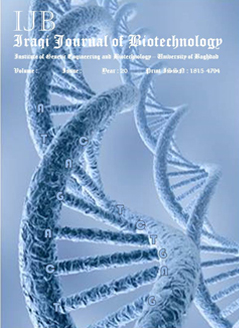Cytotoxicity Effect of Glucokinin Isolated from Bauhinia variegata Against Several Cancer Cell Lines
Abstract
Cancer is the major health issue around the world, in spite of the development in the diagnosis and therapy methods. The discovery of new anticancer drugs from plants become the new trend in the scientific research. The phytochemicals, consider selective in their action and specially not to be harmful for normal cell like other cancer treatments. In the current study, leaves of Bauhinia variegata were collected from Baghdad University garden in spring of 2019 and Glucokinin was isolated and purified from the methanol extract of B. variegata by using column chromatography. The cytotoxicity effects of Glucokinin were investigated via MTT assay against cancer cell lines HepG2, A549 and WRL normal cell line at 24, 48 and 72h. by using different concentrations. The result showed that, the highest cytotoxicity of Glucokinin at 400 µg/ml was 46.53% (std. ±5.8) at 72h. against A549 cell line. And the half maximal inhibitory concentration (IC50) of Glucokinin that inhibit the A549 cancer cell line was 114.5 µg/ml at 72h. The greatest cytotoxicity effect against HepG2 was 71.75% (std.±6.5) at 72h. The (IC50) of Glucokinin that inhibit the proliferation of HepG2 cancer cell line was 51.24 µg/ml at 72h. Additionally, Glucokinin showed high IC50 against WRL normal cell line. In conclusion, these finding show the probability of using Glucokinin as anticancer agent.


